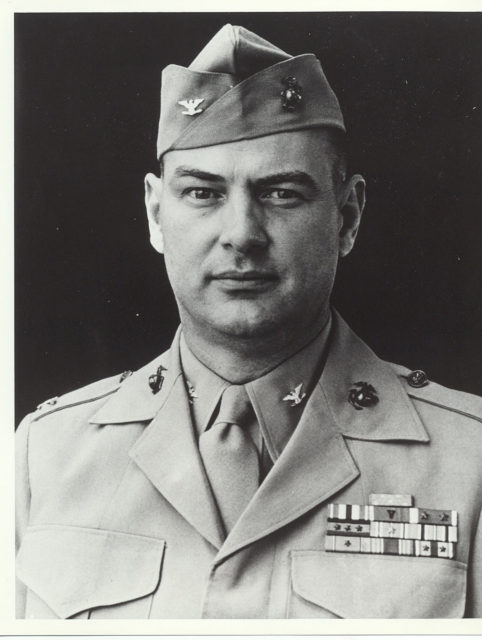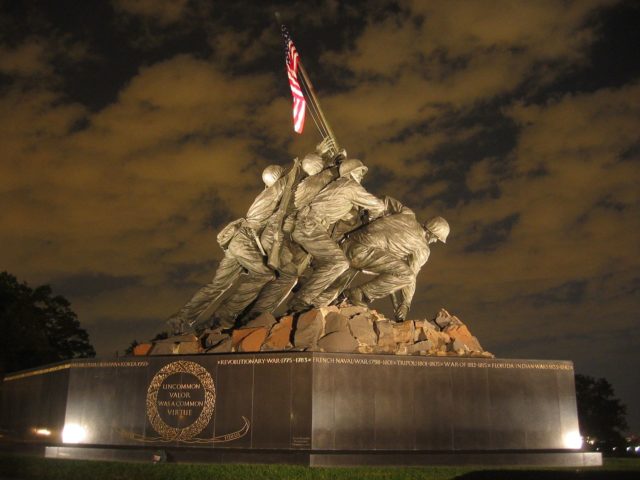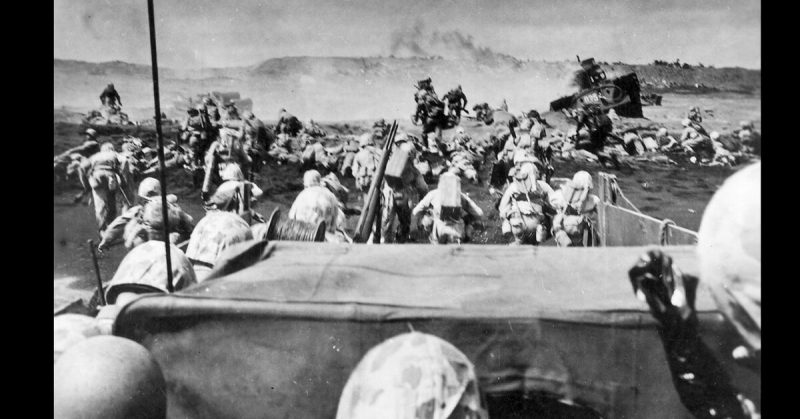During the vicious battle of Iwo Jima, 27 men were awarded the Medal of Honor for inexplicable acts of gallantry to capture a mere 8 square mile of volcanic rock. It was one of the costliest and bloodiest battles of WWII, and its importance to the legacy of the Marine Corps cannot be understated. To this day Marines make a pilgrimage to the island. They climb Mt. Suribachi and often leave their dog tags or rank insignias on the mountain in honor of what was accomplished during the brutal campaign. On Iwo Jima “uncommon valor was a common virtue” – much of it was due to ordinary men like Justice Chambers completing extraordinary acts of bravery.
Primed to Lead in Combat
Justice Chambers was born on February 2, 1908, in Huntington, WV near the Kentucky border. Not initially set on a military career, he studied at university in Washington D.C. graduating with a law degree. He also enrolled in the Naval Reserve. Feeling civilian life did not offer a challenge, in the early 1930s he joined the Marines as a private. In 1932 he received an Officer’s commission and by 1940 when the 5th Battalion was called up he had achieved the rank of Major.
Chambers was involved in the action in the Solomon and Mariana Islands. In both campaigns, he was seriously wounded, but continued to lead his troops. His leadership was so prominent he was awarded the Legion of Merit.
The planners of the invasion of Iwo Jima thought the fight across the beaches would be relatively quick as Iwo had “good” beaches. Those beaches became what one reporter called a “nightmare in hell.” What they did not expect were 15-foot dunes of soft black volcanic ash that the America Amtracks could not climb and which became a slog for the Marines. The Japanese waited for the beaches to become jammed with soldiers and equipment and then opened fire. Raining down a counterattack of mortar and artillery, were it not for the leadership of Marines like Justice Chambers all could have been lost.

Assault the Hill
On February 19, 1945, Chambers was the commanding officer of the 3rd Assault Battalion Landing Team, 25th Marines, 4th Marine Division. Staring up at Mt. Suribachi as they approached in the landing craft, Chambers knew they were in for a fight as they were attacking directly beneath the enemy high ground. The Japanese artillery was dug into the mountain, and they were firing at the Americans with lethal accuracy.
Chambers knew the troops would have to attack. In the face of overwhelming firepower that would kill close to 50% of the 3rd Battalion and half the officers, his actions were “essential to the success of the D-Day [Iwo Jima] operations”. When they landed the Japanese were relentlessly shelling the beach with artillery and mortar fire, while embedded infantry rained down machine-gun and rifle fire. Americans were being killed in astonishing numbers.
Chambers reacted immediately. Under fire and in the open, he rallied the surviving troops and charged toward the cliffs. For the next 8 hours, he gathered the men time and again all the while leading from the front.

The Medal of Honor
Charging up the hill to flank the enemy position, they drove the Japanese off but at a heavy cost. By the time the hill was taken, Chambers had lost most of his key officers. Disregarding his own safety he gathered what was left of his unit back together to attack the enemy’s main line of defense. Chambers attacked a rocket platoon with complete disregard for his own safety. The Japanese soldiers returned fierce firepower in his direction.
Critically wounded, he was evacuated under heavy fire. The men showed great respect for their leader who had gotten them so far. Chamber’s leadership that day “was directly instrumental” in the victory of the 5th Amphibious Corps. During the battle his heroism and complete lack of concern for his own safety, no doubt saved the lives of numerous Marines on the beaches of Iwo Jima.
For his actions, he was awarded the Medal of Honor and the respect of every Marine. The battle of Iwo Jima lasted from February 19 to March 26, 1945. It was five weeks of bloody, ferocious combat and will forever be engrained in the American psyche and the United States Marine Corps.
Due to the leadership of men like Justice Chambers, many more Marines returned home to tell their story first-hand.
